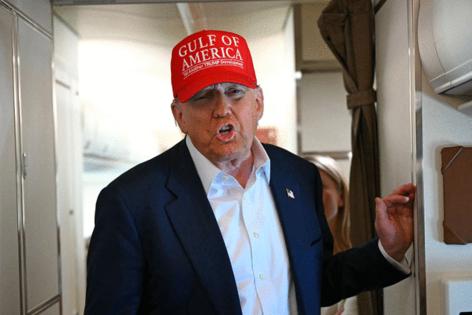Trump has big plans for America's next birthday. Historians have questions
Published in News & Features
WASHINGTON — As Americans mark the Fourth of July holiday this weekend, the Trump administration is planning ahead for the 250th anniversary of the Declaration of Independence next year, a moment of reflection for a nation beset by record-low patriotism and divided by heated culture wars over the country’s identity.
White House officials are actively involved in state and local planning for the semiquincentennial after the president, in one of his first acts in office, established “ Task Force 250” to organize “a grand celebration worthy of the momentous occasion.”
The administration has launched a website offering its telling of the nation’s founding, and Donald Trump’s “Big Beautiful Bill” — which he had hoped to pass by this Independence Day — includes a provision allocating $40 million to commission 250 statues for a “National Garden of American Heroes,” to be built at an undetermined location.
Trump has been thinking about the 250th anniversary for years. He invoked the occasion in his first joint session to Congress in 2017, stating it would be “one of the great milestones in the history of the world.” And in 2023, campaigning for a second term, he proposed a “Great American State Fair” to take place around the country throughout the year.
But that milestone year comes amid fierce debate over Trump’s attempts to exert government control over the teaching of American history.
In March, Trump signed an executive order aimed at “restoring truth and sanity to American history,” directing public institutions to limit their presentation of the nation’s history without nuance or criticism. “ This is not a return to sanity,” the Organization of American Historians responded at the time. “Rather, it sanitizes to destroy truth.”
On the “America 250” website created by the White House, the account of the nation’s founding is outsourced to Hillsdale College, a far-right institution that was a member of the advisory board for Project 2025.
“A question over this coming year is whether the celebrations around the 250th will be used as yet another cudgel in the culture wars where the goal is to divide rather than unite,” said David Ekbladh, a history professor at Tufts University.
“The view Trump’s ‘Task Force 250’ seems to be laying out is comfortable, but doesn’t give us a full view of that historical moment,” Ekbladh said. “And a full view doesn’t reduce things to a story of tragedy or oppression — although there was plenty of both — but can show us the full set of experiences that were the foundations of a dynamic country.”
In 1976, when the United States marked its 200th birthday, the festivities were prolific. Federal government letterhead was decorated for over a year to mark the anniversary. State-sponsored celebrations were designed to revive a national sense of patriotism that had been challenged by a stagflating economy, lingering trauma from the political convulsions of the late 1960s and the Vietnam War.
A full schedule of events has yet to be made public. But scholars expect echoes of 1976, when government efforts to instill pride in a weary nation met with mixed success.
“In 1976, there were dueling celebrations: official, government-sponsored ones, and ‘people’s’ observances organized by progressive groups,” said Michael Kazin, a history professor at Georgetown University. “I expect something of that kind will occur next year too.”
There are significant differences. This time, the nation will celebrate a constitutional system of checks and balances under historic pressure from a president testing the bounds of executive power.
“Two hundred and fifty years of constitutional democracy is well worth honoring,” said Andrew Rudalevige, a history professor at Bowdoin College, “but this particular anniversary is symbolic in ways that resonate exactly opposite to Trump’s vision of governance and history.”
Most of the Declaration of Independence, Rudalevige noted, is dedicated to laying out “how centralized executive authority leads to tyranny, and must be opposed.” And the document’s promise of inalienable rights and the pursuit of happiness have been a beacon of hope and inspiration to immigrants since the founding.
“So the next year will mark a hugely important tension between the version of American history that Mr. Trump and his allies want taught — and actual American history,” Rudalevige said. “We will have a sort of polarized patriotism.”
That polarization has already become evident in recent polling.
A survey published by Gallup this week found that a historically low number of Americans feel patriotic, with 58% of U.S. adults identifying as “extremely” or “very” proud to be an American. That is nine points lower than last year, and the lowest figure registered by Gallup since they began polling on the matter in 2001.
Pride among Republicans has stayed relatively consistent, with 92% registering as patriotic. But it has plummeted among Democrats and independents. And pride decreased across parties by age group, with more Democrats in Gen Z — those born between the mid-1990s and mid-2010s — telling Gallup they have “little” or “no” pride in being an American than saying they are extremely or very proud.
If nothing else, historians said, the anniversary is an opportunity for everyday Americans to reflect on the country they want to live in.
“To be sure, for many people the day is just a day off and maybe a chance to go to a parade and see some fireworks,” said Ekbladh, of Tufts. “But the day can and should be a moment to think about what the country is.”
©2025 Los Angeles Times. Visit at latimes.com. Distributed by Tribune Content Agency, LLC.







Comments